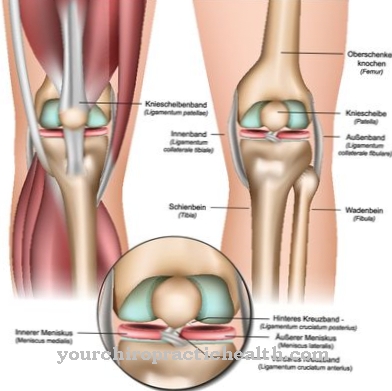Bladder cancer, which is also called Bladder cancer, Bladder cancer or Bladder cancer known is a cancer that can mainly occur in older men. It usually develops in the mucous membrane of the urinary bladder and can develop into a malignant tumor. If the bladder cancer is detected in good time, the chances of a cure are particularly good through a cystoscopy. Typical signs of bladder cancer are usually blood in the urine and burning pain when urinating.
What is bladder cancer?

Bladder cancer is a type of cancer in which malignant tumors occur in the mucous membrane of the urinary bladder, which can grow deep into the bladder wall and subsequently spread to surrounding organs. Bladder cancer is also known as bladder cancer or bladder cancer.
Men are about three times more likely to develop bladder cancer than women. Bladder cancer is thus one of the most common types of cancer in men and three percent of all malignant cancers are tumors of the bladder. The likelihood of developing bladder cancer increases with age.
As a result, bladder cancer is very rarely found in people under the age of forty and usually only develops from the age of sixty to eighty.
Causes of Bladder Cancer
Bladder cancer is favored by a wide variety of factors, but the exact causes of bladder cancer are not yet known. One of the biggest risk factors for bladder cancer is long-term cigarette consumption. Another cause of bladder cancer can be chronic diseases of the urinary bladder, such as cystitis or bladder stones.
Bladder cancer is also favored by frequent contact with various chemicals, such as aromatic amines. In many cases, bladder cancer also occurs in people who are or have been exposed to such chemicals over a long period of time, for example in rubber or paint production.
Misuse of various pain relievers that contain phenatecin is also considered a risk factor for bladder cancer. Bladder cancer can also be caused by parasite infestations found in tropical regions. There is also a link between the consumption of artificial sweeteners and bladder cancer.
You can find your medication here
➔ Medicines for bladder and urinary tract healthSymptoms, ailments & signs
Bladder cancer initially causes only a few, unspecific symptoms. Often the first sign is painless bleeding with reddish-brown colored urine. At an advanced stage, many patients experience bladder spasms, painful urination, and an increased need to urinate, but only little urine is excreted.
The pain is usually sharp and can radiate into the flanks. Enlarged lymph nodes and venous or lymphatic congestion are also typical symptoms. If the tumor presses on the surrounding tissue or organs, pressure pain and occasionally sensory disorders and paralysis can occur in the affected area. As the disease progresses, there may be bone pain and bladder dysfunction.
Ultimately, there is complete urinary retention and, as a result, further complaints. Urinary ruptures and fever, which increase in intensity as the urinary retention progresses, are typical. Kidney pain, colic and cramps can also occur in the course of untreated bladder cancer.
Since all symptoms are also possible with cystitis and similar diseases, a clear diagnosis can only be made if several signs appear and do not subside with the usual treatment measures. Due to the rather unspecific symptoms, the family doctor or a urologist should be consulted when the first symptoms arise.
course
In most cases, bladder cancer is heralded by the appearance of bloody urine.
In some cases, the blood can be seen with the naked eye, but it can also only be detected in the course of a urine test. Pain is rare, but a burning sensation can occur during and after urination.
An increased urge to urinate can also be observed in bladder cancer. Since these symptoms can also indicate a harmless illness, one should consult a urologist if one or more of these symptoms occur.
He can use various examinations, such as bladder reflections, ultrasound, protein sample analyzes or tissue samples to determine whether it is bladder cancer. In addition, if a large tumor already exists, the patient may experience complete urinary obstruction.
Complications
The earlier bladder cancer is discovered and thus treated, the better the person's chances of survival and the lower the risk of complications. Metastases, i.e. daughter tumors that can spread from the tumor via the bloodstream to other organs, usually only form when the bladder cancer has reached the muscle layer of the urinary bladder.
Due to the good blood circulation, this offers a wide attack surface for metastases. This also reduces the chances of survival. Often, after one cancer has been overcome, another occurs, which is why follow-up care and regular examinations are very important. Chemotherapy can lower the risk of recurrence.
The different forms of therapy also harbor some risks. Surgery can result in less urine being held in the bladder. In addition, women cannot have childbearing potential after a complete removal and men may be impotent. In the days after the operation, pain appears, for which appropriate means are prescribed.
In addition to normal irritation and discomfort, chemotherapy of the bladder can lead to kidney damage. Side effects of immunotherapy include blood in the urine and flu-like symptoms, which can range from simple fatigue to fever and diarrhea.
- Injury to the urethra or ureter,
- increased tendency to bleed,
- Impairment of neighboring organs.
Since urinary stones have a high recurrence rate, successful removal does not guarantee a lifelong healing. Anyone who has ever had bladder stones should therefore pay particular attention to prevention.
When should you go to the doctor?
Bladder cancer initially manifests itself with little or no discomfort, which makes it difficult to recognize. In addition, harmless urinary tract diseases can cause similar symptoms. Once the tumor in the bladder has been diagnosed and treated, it is important to consult a urologist immediately if there is more blood in the urine or if there is pain when urinating. Symptoms such as urinary congestion and problems with emptying the bladder are also reasons to consult a urologist.
If the tumor has already spread to other organs, it is necessary to consult other specialists. In addition to or instead of surgical treatment, radiation therapy can be an alternative. A radiology specialist then decides on this treatment.
In addition, radiologists also assess the location of the tumor using special examinations, such as computed tomography or magnetic resonance imaging. In the event that the bladder cancer has progressed so far that there is no chance of a cure, a specialist in pain therapy / palliative medicine will take over further treatment.
Doctors & therapists in your area
Treatment & Therapy
Bladder cancer, if diagnosed early, can be treated well. The treatment that is instituted depends on the size and location of the tumor. In bladder cancer, a distinction is made between superficial and aggressive tumors. Superficial tumors can be removed with a rather uncomplicated operation. In many cases, however, recurring bladder tumors can occur again and again even after successful interventions. For this reason, regular examinations and medication are prescribed after the operation.
In the case of aggressive tumors that have already grown into the bladder wall and beyond, major surgery is usually necessary. Here the entire bladder is removed and the urinary diversion is diverted. In some cases, the prostate must be removed in men and parts of the uterus in women. Some of the operations are either accompanied by chemotherapy or replaced. Bladder cancer can be cured, especially if it's detected early.
Outlook & forecast
The chances of recovery for a patient with bladder cancer depend on several factors. If it is a superficial bladder cancer, the patient has the best prospects for a cure, provided the necessary therapy is carried out promptly. In addition, there is a high chance of a cure if the bladder is removed as quickly as possible when bladder cancer occurs and the tumor has penetrated the least amount of the bladder wall. These are the cases in which there is a very good chance of recovery.
If the cancer spreads, the chances of a cure are slim. Scatter is the process by which the cancer affects the lymph nodes and metastases in other organs besides the bladder. In this case, chemotherapy is usually performed, but it is often used not to recover, but to stop the cancer from progressing. The therapies used for metastases aim to provide relief for the patient. This includes relieving the patient of pain as much as possible.
In summary, it should be noted that the earlier the cancer is discovered and the earlier the necessary therapy is initiated, the higher the patient's chances of recovery.
You can find your medication here
➔ Medicines for bladder and urinary tract healthYou can do that yourself
In the case of bladder cancer, all treatment steps and accompanying measures should be worked out in cooperation with the doctor. In addition, those affected can improve their general well-being with a range of home remedies and tricks.
First of all, dietary measures are recommended. Food like cabbage vegetables, olive oil or red wine inhibit cancer formation and promise good chances of recovery, especially in connection with conventional medical therapy. In order to protect the bladder lining, urinary tract and kidneys, you should also drink enough.
It is also advisable to remove stimulants such as alcohol and caffeine from the menu and, if necessary, to stop smoking. Which diet is suitable in detail can be determined as part of a nutritional consultation. Appropriate advice, which is offered in many hospitals and rehabilitation clinics, also provides information about possible sports activities with bladder cancer.
After a long illness, regular exercise can usually improve the quality of life. The way back to everyday life and dealing with the disease can also be made easier by talking to a therapist. The attending physician can show you further possibilities for self-help during bladder cancer.

















.jpg)







.jpg)


